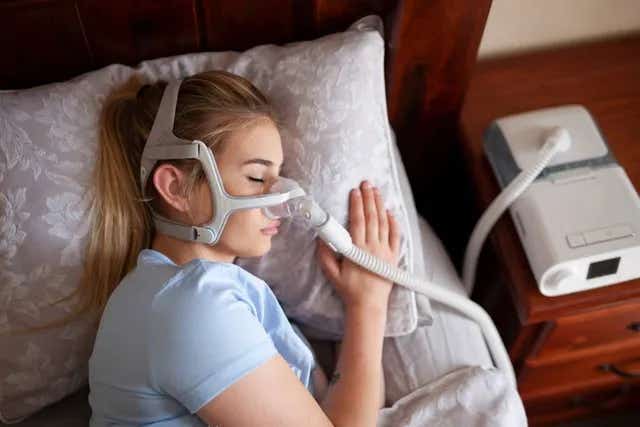Scientists reveal the link between the brain, hypertension and sleep apnea
New research could lead to new drugs targeting the brainstem to help normalize blood pressure in those with sleep apnea

Nearly 40 million adults in the U.S. suffer from sleep apnea. (CREDIT:
Creative Commons)
Nearly 40 million adults in the U.S. suffer from sleep apnea, and more than 30 million rely on continuous positive airway pressure (CPAP) machines while sleeping. However, these machines can be expensive, cumbersome, and uncomfortable, leading many users to abandon them.
Sleep apnea is often linked to high blood pressure. During sleep, the brain works harder to regulate blood flow and breathing. A recent study at the University of Missouri has shed new light on the brain mechanisms that contribute to hypertension in individuals with sleep apnea.
This research could lead to new drugs targeting the brainstem to help normalize blood pressure in those with sleep apnea. The study was conducted in David Kline's lab, a professor in Mizzou’s College of Veterinary Medicine and a researcher at the Dalton Cardiovascular Research Center.
“When oxygen levels in the blood drop during sleep apnea, the forebrain sends warning signals to the brainstem area that controls heart and lung functions,” Kline explained. “We found that two neurochemicals, oxytocin and corticotropin-releasing hormone (CRH), cause the brainstem to become overactive. Over time, this leads to hypertension.”
Hypertension increases the risk of stroke, metabolic complications, and various other health issues.
“Individuals with sleep apnea not only often have high blood pressure, but they also experience significant sleep loss, cognitive and memory problems, and a higher risk of workplace injuries due to sleepiness,” Kline added.
By being the first to identify the role of oxytocin and CRH in strengthening and overexciting the pathways involved in sleep apnea, Kline and his team aim to develop better therapeutic approaches for humans and animals.
Related Stories
“Our ultimate goal is to help clinicians develop specific drugs targeting these neurochemicals or the proteins they bind to, reducing high blood pressure,” Kline stated. “This discovery paves the way for future research to block the pathways used by these neurochemicals, ultimately helping to normalize blood pressure.”
Over nearly 20 years, Kline has researched brain mechanisms controlling blood pressure and respiration at Mizzou, earning over $10 million in grants and publishing more than 40 studies in peer-reviewed journals. His work has contributed to Mizzou’s status as a leading research university and a member of the Association of American Universities, with 10 consecutive years of increased research expenditures.
“I have always been fascinated by the brain and its role in the cardiovascular and respiratory systems,” Kline shared. “I have a great group of interdisciplinary collaborators at Mizzou who have helped me tremendously, and seeing others in my lab make scientific discoveries brings me immense joy and excitement.”
The study was led by Procopio Gama de Barcellos Filho, a postdoctoral researcher in Kline’s lab.
“Dr. Kline is an encouraging and motivating supervisor. While I have always been interested in neuroscience, he has helped me see the bigger picture of how the brain connects with the cardiovascular and respiratory systems,” Gama de Barcellos Filho said. “He values the input of everyone in his lab before making final decisions, a practice I plan to follow if I ever become a principal investigator.”
By understanding the connection between sleep apnea and high blood pressure, researchers hope to improve the quality of life for millions affected by these conditions. This study represents a significant step towards developing treatments that address the root causes of hypertension in sleep apnea patients, potentially reducing the reliance on CPAP machines and improving overall health outcomes.
With further research, the aim is to create more effective therapies that target the specific neurochemicals involved, ultimately leading to better management of blood pressure and reduced health risks for those with sleep apnea. This breakthrough underscores the importance of interdisciplinary collaboration in advancing medical science and developing innovative treatments.
Note: Materials provided above by The Brighter Side of News. Content may be edited for style and length.
Like these kind of feel good stories? Get The Brighter Side of News' newsletter.
Joshua Shavit
Science & Technology Writer | AI and Robotics Reporter
Joshua Shavit is a Los Angeles-based science and technology writer with a passion for exploring the breakthroughs shaping the future. As a contributor to The Brighter Side of News, he focuses on positive and transformative advancements in AI, technology, physics, engineering, robotics and space science. Joshua is currently working towards a Bachelor of Science in Business Administration at the University of California, Berkeley. He combines his academic background with a talent for storytelling, making complex scientific discoveries engaging and accessible. His work highlights the innovators behind the ideas, bringing readers closer to the people driving progress.



